
The president of Poland, officially the president of the Republic of Poland, is the head of state of the Republic of Poland. Their rights and obligations are determined in the Constitution of Poland. The president heads the executive branch. In addition, the president has the right to dissolve parliament in certain cases, can veto legislation, represents Poland in the international arena and is the commander-in-chief.

The Polish government-in-exile, officially known as the Government of the Republic of Poland in exile, was the government in exile of Poland formed in the aftermath of the Invasion of Poland of September 1939, and the subsequent occupation of Poland by Germany, the Soviet Union, and the Slovak Republic, which brought to an end the Second Polish Republic.

Lech Aleksander Kaczyński was a Polish politician who served as the city mayor of Warsaw from 2002 until 2005, and as President of Poland from 2005 until his death in 2010. Before his tenure as president, he previously served as President of the Supreme Audit Office from 1992 to 1995 and later Minister of Justice and Public Prosecutor General in Jerzy Buzek's cabinet from 2000 until his dismissal in July 2001.
The Council of Three was a collegial body created by the Polish Government in Exile in 1954 with prerogatives of the President of Poland. It consisted of three members of the government chosen by the Council of Naytional Unity, a rump parliament in exile.

Count Edward Bernard Raczyński was a Polish diplomat, writer, politician, President of Poland-in-exile.

Kazimierz Aleksander Sabbat, was President of Poland-in-exile from 8 April 1986 until his death, 19 July 1989, after serving as Prime Minister of the Polish government-in-exile.
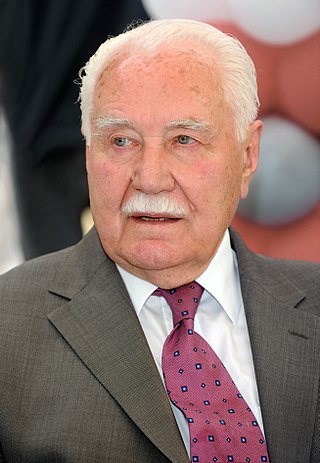
Ryszard Kaczorowski, GCMG ; 26 November 1919 – 10 April 2010) was a Polish statesman. From 1989 to 1990, he served as the last President of Poland-in-exile. He succeeded Kazimierz Sabbat, and resigned his post following Poland's regaining independence from the Soviet sphere of influence and the election of Lech Wałęsa as the first democratically elected President of Poland since before the Second World War. He died on 10 April 2010 in the plane crash near Smolensk, Russia, along with the President of Poland Lech Kaczyński and other senior government officials.

Edward Franciszek Szczepanik was a Polish economist and the last Prime Minister of the Polish Government in Exile.
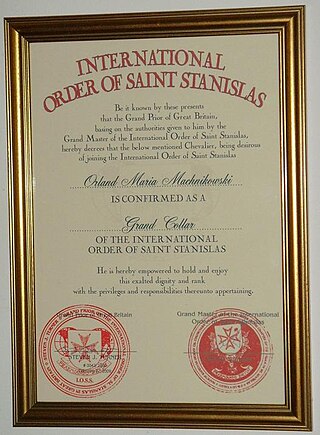
The International Order of Saint Stanislaus is a Polish fraternal order founded on 16 May 2004.

August Zaleski was a Polish economist, freemason, politician, and diplomat. Twice Minister of Foreign Affairs of the Republic of Poland, he served as President of Poland-in-exile.

Stanisław Ostrowski was a Polish politician, best known for serving as the last Polish Mayor of Lwow, and was President of Poland-in-exile.
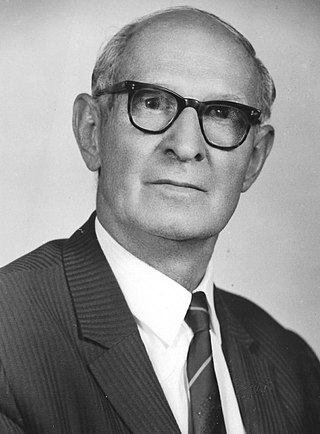
Alfred Urbański was a Polish politician, a member of the Polish Socialist Party (PPS), primarily known for his political activities within the Polish Government in Exile.
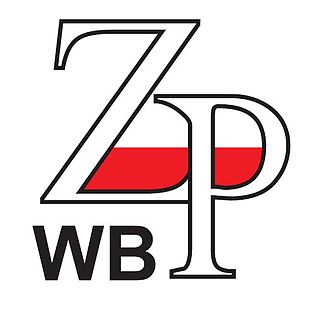
The Federation of Poles in Great Britain is a voluntary umbrella organisation established to promote the interests of Poles in the United Kingdom and to promote the history and culture of Poland among British people. As a charity the Federation's statutes contain detailed information about its objectives and responsibilities.
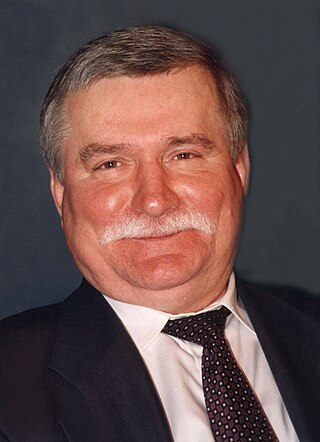
Lech Wałęsa is a Polish statesman, dissident, and Nobel Peace Prize laureate, who served as the president of Poland between 1990 and 1995. After winning the 1990 election, Wałęsa became the first democratically elected president of Poland since 1926 and the first-ever Polish president elected by popular vote. A shipyard electrician by trade, Wałęsa became the leader of the Solidarity movement, and led a successful pro-democratic effort, which in 1989 ended Communist rule in Poland and ushered in the end of the Cold War.
Rotmistrz Ryszard Dembiński was a Polish Cavalry officer and D-Day Veteran, who, following World War II, helped to establish the Polish Institute and Sikorski Museum in London, which he chaired for 25 years (1979–2004).
The Ordo Sancti Stanislai is a Polish self-styled order founded on 9 June 1979 by Juliusz Nowina-Sokolnicki, in his claimed capacity as disputed President of the Polish Government in exile as an attempted revival of the Polish Order of Saint Stanislaus, founded in 1765 as an order of knighthood of the Polish–Lithuanian Commonwealth, since it had been incorporated by the Russian Empire in 1831 as the Order of Saint Stanislaus.

Adam Mieczysław Ostrowski was a Polish RAF pilot who fought in World War II and was active in Polish organisations.
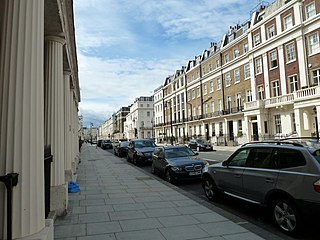
Eaton Place is a street in London's Belgravia district.















